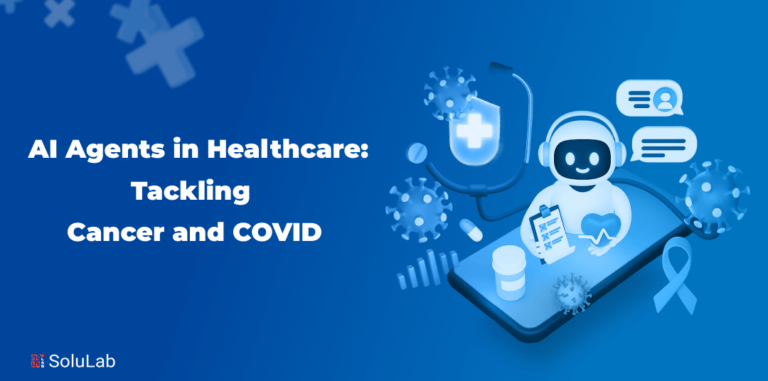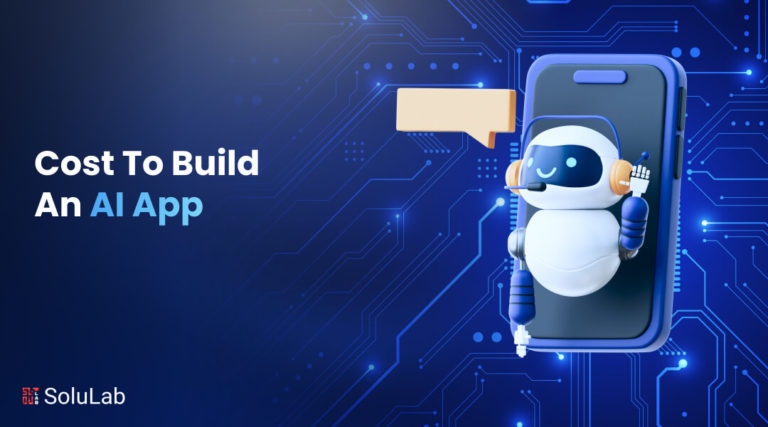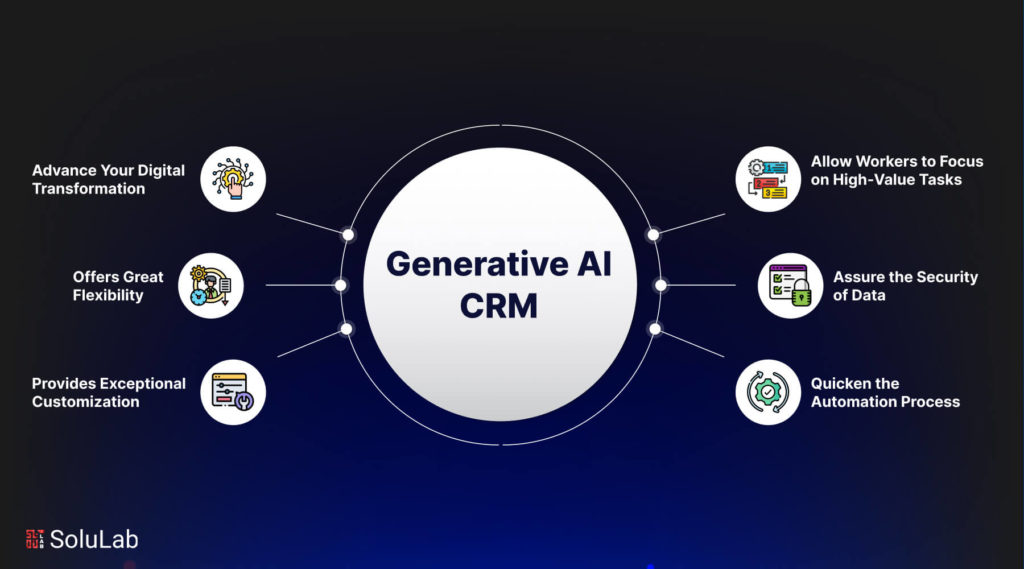
Highly profitable companies have long placed customer relationship management at the core of their operations, enabling them to monitor and evaluate their consumer interactions. However, as technology advances, classic CRM systems are evolving to incorporate state-of-the-art AI. When it comes to software, almost 80% of CRM clients look for AI or machine learning features. Therefore, integrating Generative AI in CRM systems is becoming a game-changing trend.
Businesses are encouraged to take use of complex language models’ potential for automating and enhancing customer interactions by integrating generative AI with CRM systems. Combining the two enables businesses to better understand and anticipate the demands of their customers, tailor their tactics, and raise customer satisfaction.
In this blog, we will look into what generative CRM is, its benefits, use cases, and real-life examples in more depth!
What is Generative AI CRM?
Customer relationship management (CRM) solutions have transformed significantly in today’s digitally driven corporate sector. They have developed into complex platforms that provide organizations with insights and plans, rather than merely being databases that record consumer encounters. The notion of Generative CRM is one of the most inventive developments in this field.
Fundamentally, generative AI CRM combines the capabilities of standard CRM features with the capability of generative artificial intelligence (AI), enabling enterprises to:
- Examine consumer information
- Obtain fresh perspectives
- Make projections
- Customize communications with your clients.
With the assistance of generative CRM, you can complete difficult tasks and save up time to concentrate on significant initiatives. Examining relevant data and the internet facilitates the creation of better replies in the future.
Benefits of Generative AI CRM
Individuals put in countless hours performing menial duties in order to complete their employment. In order to create a campaign for new initiatives, they go through data and research, write and rewrite, and then scurry to strike a balance while speaking with irate consumers.
No matter what department or sector you work in, picture a gadget that could simplify everything. The generative CRM technologies integrate CRM across several sectors with the power of generative AI. There are numerous AI CRM benefits. Each of them is discussed below.
-
Assure the Security of Data
This is given priority by generative CRM systems, which guarantee the secure storage of both user-provided data and data that is accessible to the public. Private client data is safely stored in the cloud, even if they use a combination of public and private data to provide insightful analyses. With this two-pronged strategy, data privacy is maintained while ensuring maximum data use.
-
Allow Workers to Focus on High-value Tasks
Because of its AI-powered features, generative CRM automates repetitive and boring processes. This enables human resources to move their emphasis from manual tasks to more strategic endeavors. Upon removing tedious tasks, experts may focus on intricate account administration, cultivating more meaningful connections with clients, and developing customized solutions. This improves the quality of the client experience as well as the range and depth of services provided.
-
Quicken the Automation Process
Generative CRM transforms static procedures into dynamic, self-improving processes, pushing the limits of conventional automation. Rather than just carrying out preset tasks, this system proposes improvements to processes, finds possible bottlenecks, and even makes real-time strategy adjustments. By doing this, it guarantees that companies run as efficiently as possible while remaining flexible and adaptable to shifting market conditions.
Related: Generative AI Automation
-
Advance Your Digital Transformation
Using generative CRM isn’t just a step toward digitalization; it’s a move into a new era of business operations. Generative CRM goes beyond simple data collecting; it also produces insights, forecasts client and market trends, and provides adaptable tactics based on the individual preferences and history of each customer. It represents a digital transition in which companies can adapt quickly to changing consumer demands and market conditions.
-
Provides Exceptional Customization
Generative CRM is highly beneficial for organizations due to its ability to provide unmatched customization by producing customized and contextually relevant information for each and every consumer. Businesses may connect with consumers in ways that are meaningful to them because of the customization level, which fosters strong bonds and increases brand loyalty. Moreover, communications that feel custom-made are likely to elicit favorable responses from users of personalized material.
-
Offers Great Flexibility
The inability of traditional CRM systems to grow with the business results in higher workloads for customer care staff. Through the automation of numerous client contacts, the generative AI CRM also provides a scalable solution. Because of this, companies are able to provide their customers with an excellent experience even as their clientele grows.
Use Cases for Generative AI in CRM
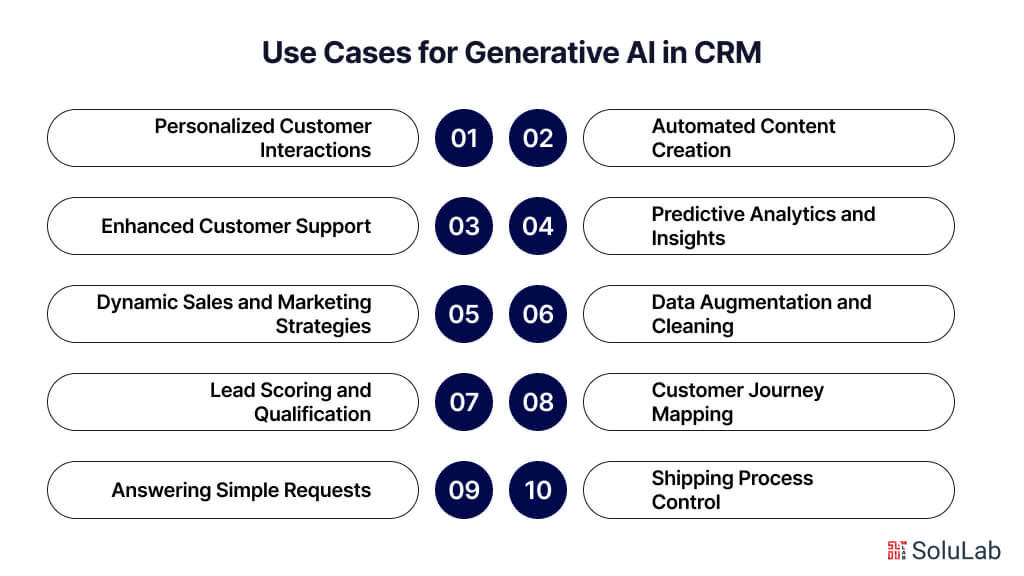
Generative AI is transforming Customer Relationship Management (CRM) by enhancing customer interactions, streamlining processes, and providing deeper insights. Here are some key use cases of Generative CRM:
1. Personalized Customer Interactions
Generative AI applications in CRM enable highly personalized customer interactions. By analyzing customer data and behaviors, generative AI can craft tailored messages and recommendations. This personalization improves customer satisfaction and engagement, leading to higher conversion rates and customer loyalty.
2. Automated Content Creation
One of the prominent use cases of Generative CRM is automated content creation. Generative AI can produce emails, social media posts, and other marketing materials. This not only saves time but ensures consistent messaging and branding across all customer touchpoints. AI-generated content can be tailored to different segments, making marketing campaigns more effective.
3. Enhanced Customer Support
Customer assistance is being revolutionized by chatbots and virtual assistants driven by generative AI. These technologies can respond quickly to a variety of questions, solve difficult problems, and, if needed, elevate them to human agents. The ability to generate natural and contextually appropriate responses enhances the customer support experience and reduces wait times.
4. Predictive Analytics and Insights
Generative AI use cases in CRM extend to predictive analytics. By generating models that predict customer behavior, AI can help businesses anticipate customer needs, identify potential churn risks, and optimize marketing strategies. This foresight enables more proactive and strategic decision-making.
5. Dynamic Sales and Marketing Strategies
Generative AI can dynamically adjust sales and marketing strategies based on real-time data. For instance, AI can generate personalized sales pitches or suggest optimal times to reach out to customers. Because of their adaptability, sales and marketing initiatives are constantly in line with consumer tastes and the state of the market.
6. Data Augmentation and Cleaning
In CRM, having clean and comprehensive data is crucial. Generative AI applications can augment and clean CRM data by generating missing information, correcting errors, and ensuring data consistency. This leads to more accurate customer profiles and better-informed business decisions.
7. Lead Scoring and Qualification
Generative AI can automate the process of lead scoring and qualification. By analyzing historical data and identifying patterns, AI can generate scores that indicate the likelihood of a lead converting into a customer. Sales teams may use this method to concentrate on high-potential leads and optimize their efforts.
8. Customer Journey Mapping
Generative AI can generate detailed maps of customer journeys by analyzing interactions across various touchpoints. These maps provide insights into customer behavior, preferences, and pain points, allowing businesses to optimize the customer experience at every stage.
9. Answering Simple Requests
A significant portion of queries in CRM are repetitive and straightforward. Without human assistance, generative AI may be trained to comprehend and reply to these questions. For example:
- “When was a customer’s last purchase?”
- “How much did a customer spend last month?”
- “Does the customer have an updated address?”
By automating responses to these routine questions, AI reduces the workload on customer service representatives and ensures quick, accurate replies. Additionally, generative AI can be trained to recognize and escalate more complex or sensitive questions to human agents, ensuring a seamless customer support experience.
10. Shipping Process Control
Generative AI can significantly enhance the efficiency and effectiveness of shipping processes by:
- Generating optimal shipping routes based on real-time data to minimize delivery times and costs.
- Predicting potential shipping issues, such as empty containers or delays, to proactively address them.
- Auto-generating communications to customers about their order’s shipping status, providing timely updates, and reducing anxiety.
By anticipating and managing shipping-related inquiries or concerns, Generative AI applications in CRM can offer a smoother and more reliable customer experience.
Real-life Examples of Generative CRM
Here are some real-life CRM examples, also known as Generative Customer Relationship Management, which is a new paradigm in CRM that leverages machine learning and AI to generate new customer relationships and interactions:
1. Salesforce’s Einstein Sales Navigator: Launched in 2019, Einstein Sales Navigator is a generative CRM tool that uses AI-powered sales intelligence to identify new sales opportunities and connect with potential customers. It analyzes customer data, social media activity, and buying behavior to suggest personalized connections and outreach strategies.
Example: A sales team using Einstein Sales Navigator can discover that a company is hiring a new marketing manager and use the tool to identify the best contacts to reach out to, including their email addresses and social media profiles.
2. Drift’s Conversational CRM: Drift’s Conversational CRM uses AI to automate customer interactions and generate new conversations with potential customers. It uses machine learning algorithms to analyze customer data and predict when a customer is likely to engage with a sales representative.
Example: A potential customer visits a website and engages with a chatbot powered by Drift’s Conversational AI. The chatbot identifies the customer’s interests and needs and generates a personalized conversation, offering relevant products or services.
3. HubSpot’s Conversational Forms: HubSpot’s Conversational Forms is a generative CRM tool that uses AI-powered chatbots to qualify leads and generate new conversations. It analyzes customer interactions and provides personalized recommendations for sales teams.
Example: A visitor to a website completes a conversational form powered by HubSpot’s Conversational Forms. The form uses AI-powered chatbots to ask follow-up questions and qualify the lead, providing a sales team with a list of qualified leads.
4. AmyInbox: AmyInbox is an AI-powered sales engagement platform that generates new conversations with potential customers. It uses machine learning algorithms to analyze customer data and predict when a customer is likely to engage with a sales representative.
Example: A sales team using AmyInbox discovers that a potential customer has downloaded an e-book from their website. The platform generates a personalized email outreach campaign that suggests follow-up conversations based on the customer’s interests.
5. SalesLoft: SalesLoft is an AI-powered sales engagement platform that generates new conversations with potential customers. It uses machine learning algorithms to analyze customer data and predict when a customer is likely to engage with a sales representative.
Example: A sales team using SalesLoft discovers that a potential customer has shown interest in their product on social media. The platform generates a personalized email outreach campaign that includes relevant content and suggests follow-up conversations based on the customer’s interests.
These are just a few examples of generative CRM tools that are changing the way businesses interact with customers. By leveraging machine learning and AI, these tools can help businesses generate new relationships, identify new opportunities, and personalize customer interactions at scale.
The Future of Generative AI in CRM
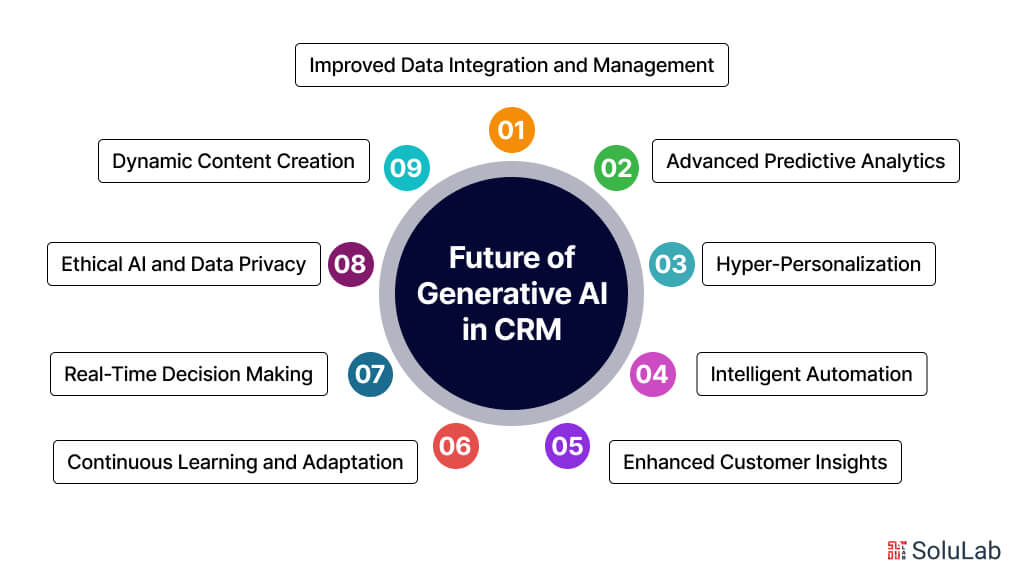
The future of generative AI in Customer Relationship Management (CRM) holds transformative potential, redefining how businesses interact with customers, manage data, and derive insights. As generative AI is here to stay, several key trends and advancements are expected to shape the CRM technology:
1. Hyper-Personalization
Generative AI enables hyper-personalization at scale, offering tailored experiences for individual customers. By analyzing vast amounts of data from various touchpoints, AI can generate personalized content, product recommendations, and communication strategies. This deep level of customization enhances customer satisfaction and loyalty, fostering stronger relationships between businesses and their clientele.
2. Advanced Predictive Analytics
The integration of generative AI with CRM systems will enhance predictive analytics capabilities. AI algorithms can analyze historical data to predict future customer behaviors, preferences, and needs. This foresight allows businesses to proactively address potential issues, optimize marketing campaigns, and improve customer retention strategies.
3. Intelligent Automation
Generative AI will drive intelligent automation within CRM processes, reducing manual effort and increasing efficiency. AI-powered chatbots and virtual assistants can handle routine customer inquiries, provide instant support, and streamline workflows. This automation not only improves response times but also frees up human agents to focus on more complex and value-added tasks.
4. Enhanced Customer Insights
By leveraging generative AI, CRM systems can uncover deeper insights into customer sentiments and trends. Natural language processing (NLP) and machine learning (ML) algorithms can analyze unstructured data from social media, reviews, and feedback forms. These insights help businesses understand customer emotions, detect emerging trends, and adapt their strategies accordingly.
5. Dynamic Content Creation
Generative AI’s ability to create dynamic content will revolutionize marketing and customer engagement. AI can generate compelling and contextually relevant content, such as emails, social media posts, and advertisements, that resonate with individual customers. This capability ensures that messaging remains fresh, engaging, and aligned with customer preferences.
6. Real-Time Decision Making
The future of generative AI in CRM includes real-time decision-making capabilities. AI allows organizations to quickly make well-informed decisions by processing and analyzing data in real-time. Whether it’s adjusting a marketing campaign on-the-fly or providing instant solutions to customer issues, real-time AI-driven insights will be crucial for maintaining a competitive edge.
7. Improved Data Integration and Management
Generative AI will enhance data integration and management within CRM systems. AI can seamlessly merge data from disparate sources, ensuring a unified and comprehensive view of the customer. This holistic perspective allows businesses to deliver more cohesive and consistent experiences across all channels.
8. Ethical AI and Data Privacy
As generative AI becomes more integral to CRM, there will be a greater emphasis on ethical AI practices and data privacy. Businesses must ensure that AI systems are transparent, fair, and secure. Adhering to ethical guidelines and regulatory requirements will be paramount in maintaining customer trust and protecting sensitive information.
9. Continuous Learning and Adaptation
Generative AI systems in CRM will continuously learn and adapt to changing customer behaviors and market conditions. Through ongoing training and refinement, AI models will become more accurate and effective over time. This continuous improvement will enable businesses to stay agile and responsive to evolving customer needs.
Final Words
In conclusion, the future of generative CRM in 2025 presents numerous opportunities for businesses to revolutionize their customer engagement strategies. By utilizing advanced AI technologies, companies can achieve hyper-personalization, improve predictive analytics, and automate routine tasks, thereby enhancing efficiency and customer satisfaction. The integration of real-time decision-making, dynamic content creation, and comprehensive data management will enable businesses to stay competitive and responsive to the ever-evolving market demands. As generative AI continues to advance, the potential for innovative applications in CRM is immense, promising a future where customer relationships are more intelligent, insightful, and impactful.
However, the implementation of generative AI in CRM is not without its challenges. Businesses face hurdles such as ensuring data privacy, maintaining ethical AI practices, and integrating AI systems seamlessly with existing infrastructure. These complexities require specialized expertise to navigate effectively. SoluLab, a leading Generative AI development company, offers tailored solutions to address these challenges. With a focus on transparency, security, and innovative AI applications, SoluLab helps businesses unlock the full potential of generative CRM. Ready to transform your CRM with innovative AI? Contact Us today to explore how SoluLab can drive your business forward.
FAQs
1. What is generative CRM and how does it differ from traditional CRM?
Generative CRM leverages advanced AI technologies to automate and enhance customer relationship management processes. Unlike traditional CRM, which primarily focuses on storing and managing customer data, generative CRM uses AI to generate personalized content, predict customer behaviors, and automate routine tasks. This leads to more efficient operations and deeper customer engagement.
2. How can generative AI improve customer personalization in CRM?
Generative AI can analyze vast amounts of data from various sources to understand individual customer preferences and behaviors. It can then generate personalized content, recommendations, and communication strategies tailored to each customer. This level of hyper-personalization enhances customer satisfaction and loyalty by providing experiences that resonate on a personal level.
3. How is a generative AI model trained?
Generative AI models are trained using large datasets relevant to the task they are designed to perform. The training process involves feeding the model data, allowing it to learn the underlying patterns and structures. For example, a text-based generative model might be trained on a vast corpus of written language, learning grammar, syntax, and context to generate coherent text. Training requires significant computational resources and iterative refinement to ensure accuracy and quality.
4. What are some real-time applications of generative AI in CRM?
Generative AI can be used in CRM for real-time decision-making, such as adjusting marketing campaigns based on current customer interactions or providing instant customer support through AI-powered chatbots. It can also generate dynamic content for emails and social media posts that are relevant and timely, enhancing engagement and responsiveness.
5. What challenges do businesses face when implementing generative AI in CRM?
Businesses may encounter challenges such as ensuring data privacy, integrating AI systems with existing CRM infrastructure, maintaining ethical AI practices, and managing the continuous learning and adaptation of AI models. These challenges require careful planning and specialized expertise to address effectively.




